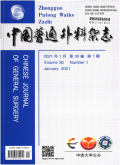中国普通外科杂志2024,Vol.33Issue(6):876-884,9.DOI:10.7659/j.issn.1005-6947.2024.06.002
主动脉脱套与TEVAR术中支架源性主动脉脱套
Aortic intimal intussusception and intraoperative stent-graft-induced aortic intimal intussusception during TEVAR
摘要
Abstract
When an acute aortic dissection occurs,the intima tears.If the tear forms a circumferential rupture,the intima distal to the tear detaches from the aortic wall and forms an independent intimal lumen.As this lumen collapses along the direction of blood flow,it creates an antegrade intimal detachment,known as aortic intimal intussusception.Aortic intimal intussusception is rare,with 90%of cases occurring during the natural progression of an aortic dissection,but it can also be a complication of thoracic endovascular aortic repair(TEVAR).With the increasing prevalence and number of TEVAR procedures in recent years,the incidence of surgery-related complications has also risen.However,reports on intraoperative stent graft-induced aortic intimal intussusception(ISAII)during TEVAR are extremely limited.This condition,being a rare type of dissection or complication,is not well-known to most physicians.Therefore,this article aims to introduce the concept,characteristics,diagnosis,classification,treatment principles and methods,and precautions of aortic intimal intussusception and ISAII,providing theoretical support for clinical practice and benefiting more patients.Aortic intimal intussusception occurring during the natural progression of the disease sometimes requires a combination of electrocardiogram-gated computed tomography angiography or cardiac ultrasound for a definitive diagnosis.In most cases,such lesions can be repaired under direct vision during open surgery.However,during TEVAR procedures,intussusception lesions are often only detectable by digital subtraction angiography,and in most cases,endovascular techniques are recommended for repair.If the intussusception lesions are not promptly identified,catastrophic consequences can occur.During TEVAR,if ISAII is detected after routine angiography,it is crucial to first preserve the surgical instruments and access routes.Next,angiography is required to clarify the type of intussusception and to distinguish the structural changes in the aorta,selecting the appropriate treatment strategy based on the classification.ISAII is classified into three types.Type Ⅰ ISAII lesion is confined to the stent-covered area of the thoracic aorta and do not require additional stent implantation.Type Ⅱ ISAII lesion is located distal to the stent-covered area but are confined to the thoracic aorta.Treatment involves implanting a covered stent in the thoracic aorta to fix the intimal flap and restore true lumen patency.Type Ⅲ ISAII lesion is located in the abdominal aorta,which is the most dangerous and requires the highest level of surgical decision-making and technical skill.In addition to implanting a covered stent in the thoracic aorta,a bare stent is needed in the abdominal aorta to fix the intimal flap and restore true lumen blood supply.关键词
动脉瘤,夹层/主动脉,胸/血管成形术/手术中并发症Key words
Aneurysm,Dissecting/Aorta,Thoracic/Angioplasty/Intraoperative Complications分类
医药卫生引用本文复制引用
马韬,符伟国..主动脉脱套与TEVAR术中支架源性主动脉脱套[J].中国普通外科杂志,2024,33(6):876-884,9.基金项目
国家自然科学基金资助项目(82170493) (82170493)
上海市卫生健康委员会科研基金资助项目(202240289). (202240289)

